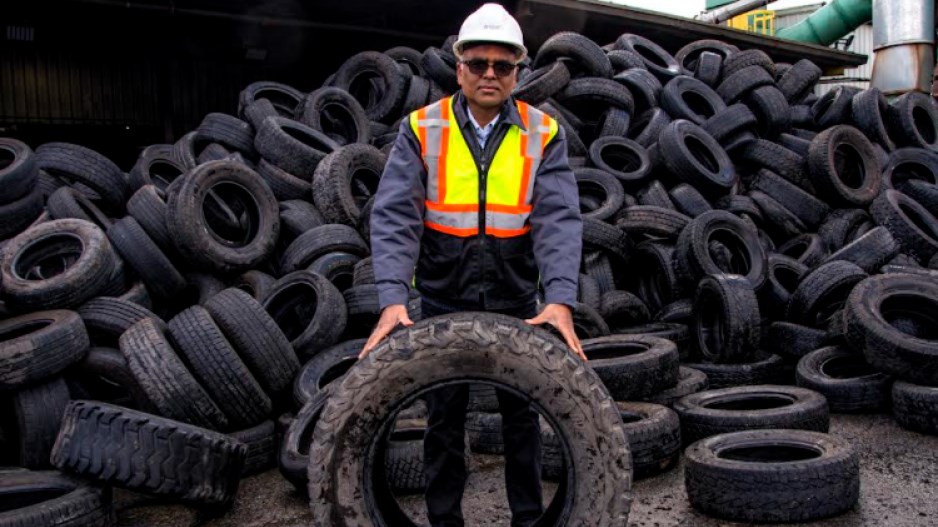Safer and more indestructible tires are a key part of the multibillion-dollar automobile industry’s decades-long drive to make vehicles safer and more reliable.
But the technology that makes tires more indestructible makes it more difficult to dispose of those tires when they have reached the end of their lifecycle.
“There’s billions and billions of dollars that were spent or that are being spent currently trying to make that tire as strong as possible so it doesn’t break down, and us poor guys on the backend are trying to break it down,” said Neil Bansal, regional vice-president of Delta-based tire recycler Western Rubber Products. “And we don’t have billions of dollars.”
While the job of breaking down tires is getting more challenging, finding customers for those reprocessed tires might be getting easier. Western Rubber Products has been supplementing its supply of shredded tires from sources in Alberta and Washington state to keep up with demand.
But demand for what purpose? Who wants old shredded car and truck tires?
It turns out lots of people.
The volume of finished products made from recycled B.C. rubber has more than tripled over the last 10 years, according to Tire Stewardship B.C. data. One of the most well-known uses of recycled tires is for athletic surfaces like artificial turf football and soccer fields as well as running tracks.
When BC Place was being renovated in 2010, a temporary outdoor stadium was built for the BC Lions using more than 22,000 tires.
But there’s only so many soccer games and track meets that need playing surfaces. So what’s accounting for all of the demand? Perhaps shockingly, plant mulch as an alternative to wood mulch is one of Western Rubber Products most popular items. Each alternative has its costs and benefits, but one reason people choose rubber mulch is because it is free of most diseases.
Western Rubber Products has two plants on Annacis Island.
Much of Vancouver’s recycling industry calls that area home, with companies recycling everything from steel and mattresses to tires.
Over five million tires are disposed of every year in B.C. equating to roughly 50,000 tonnes. Much of this volume makes its way to Annacis Island to be turned into anything from consumer products to industrial building material. That number has increased roughly 20% from just under 40,000 tonnes in 2011 and roughly 80% since the tire recycling program was written into law in the early 1990s, according to data from the province.
Before that, tires were placed in landfills, which caused a number of environmental problems, including polluting ground water and creating breeding grounds for mosquito-borne diseases like the West Nile Virus. A tire fire that lasted 17 days in 1990 in Hagersville, Ontario, also encouraged law makers nationwide to quickly enact tire recycling regulation.
Bansal believes that regulation is important to ensuring B.C.’s recycling goals are met and that every tire is accounted for and ultimately reused. Bansal is also confident that if regulation were repealed tomorrow, the recycling industry would still stay afloat based on the automotive industry’s need to dispose of used tires and consumer demand for products like rubber mulch, athletic surfaces and rubber flooring and mats for commercial, industrial and residential uses.
But Bansal cautioned that regulation would be needed to ensure that tires are collected in more rural and isolated parts of the province, because companies would focus on high-density areas to collect tires as cost effectively as possible.
Demand for recycled tire products is increasing, and while regulation plays a role, the tire recycling industry is still a business. Western Rubber Products hasn’t resorted to importing whole used tires from out of province or other countries to meet demand, but Bansal hasn’t ruled it out.
While there is a corporate social responsibility aspect to the business that Western Rubber Products takes seriously, the company does not want to reveal trade secrets like its recycling process to competitors and would rather develop its business in B.C.
“We work with many manufacturers over the year, and their demand is growing,” said Bansal. “Rather than give someone else the recipe of how to make that product [from recycled tires], I want to make it right here.”
Despite the growing market for its current products and the need to supplement its recycled tire supply with imported material, Western Rubber Products is still engaged in research and development and is working with different B.C. universities to come up with new uses for recycled tires. For example, the company is developing a use for recycled tires in building materials, including trying to integrate that rubber into concrete. •




